THE HENRY WILLIAMSON ANIMAL SAGA
A compendium of four of HW's best-known earlier stories about animals, consisting of:
Tarka the Otter
Salar the Salmon
The Epic of Brock the Badger
Chakchek the Peregrine
 |
|
| First edition, Macdonald, 1960 |
First published Macdonald, February 1960 (5000 copies) (21/-)
Reprinted in April 1960; May 1963; 1968 (price 30/-); 1974; 1975, and 1978 (price £5.95)
(Matthews, in his Henry Williamson: A Bibliography (2004), refers to the fifth, sixth and seventh impressions as being published by Book Club Associates, though copies of these impressions in the HW archive have the imprint Macdonald & Jane's)
That HW evidently did not like the cover design is shown by this torn scrap from a galley proof – a pity some is missing!
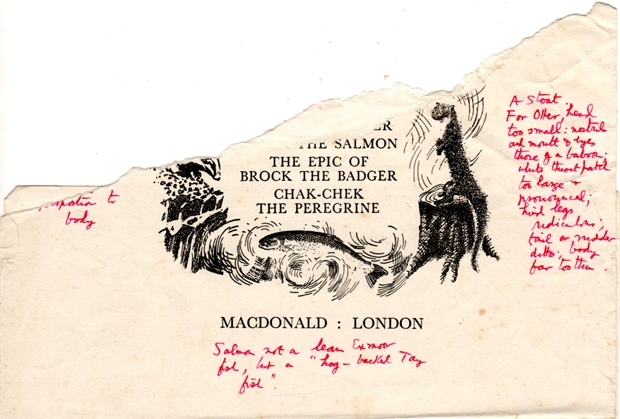
There is not very much background information for this important compendium. The first reference seems to be in his diary on 3 March 1959:

HW then set to work on the structure of the book, as the following pencilled notes show:

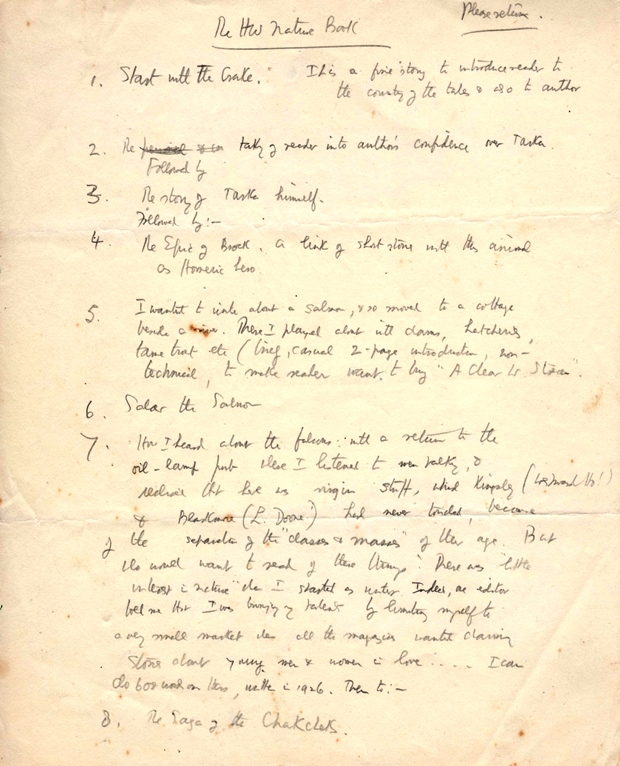
Then, on 9 April 1959, he notes:
To London, to see Faber & Macdonald over the much-harassing Animal Omnibus volume which Macdonald want to do this autumn. If it isn't done I'll have no money. . . .
Although on the surface it would seem to have been an easy book to prepare, that was not really so. Having decided what he wanted to use, there seem to have been considerable problems over obtaining permission from the different publishers involved to use the items planned for the volume. Noticeably, the illustrations by C. F. Tunnicliffe were not used (to the disappointment of some reviewers). Then, to make the work into a 'whole unit', HW decided to write new 'linking' or introductory passages, which took considerable time and energy. It should be noted perhaps that some of HW's statements in these new introductions have their own decided fictional element. As an example, the story of HW nursing his baby son while writing Tarka the Otter is known to be highly exaggerated – but it makes a very good tale! Regular readers and browsers of this website will note these with a smile of amused recognition.
At this time HW was hard at work writing 'No. 8' of A Chronicle of Ancient Sunlight – A Test to Destruction – and so his energies and thoughts were mainly concentrated on that. His comment about having no money was due to the fact that, because there was no volume of the Chronicle to be published in 1959, no lump sum advance was forthcoming. Also at this time yet more time and nervous energy was being spent on the problems involved in the renovations being carried out at the Ilfracombe cottage.
Diary entries:
10 April 1959: Saw Roger Lubbock of Putnam & Co who agreed in principle to allow Tarka & the badger & falcon epics into the animal Book, on a 3% royalty. I went to Faber & asked Kennerley (Morley) if they would reconsider allowing me to have Salar in, despite the new paperback 5/- edition, on a 2% royalty. I would have a 5% royalty. He said he'd have to ask Crawley the Sales manager-director. I telephoned this to Cyrus Brooks [his agent at A. M. Heath] & said I'd let him know the results.
14 April 1959: No letter from Morley Kennerley about including Salar, so I presume they don't want to release it. Goodbye to the Animal Book & £400 advance to carry on the 2 families this year!
22 April 1959: Wrote to Morley Kennerley of Fabers – not having heard from him – and said I quite understood about Salar in paperback having a run unencumbered by the Omnibus in the river, & would he forgive me for having been so persistent.
(And, although there is no mention of it – this letter would seem to have produced a positive response.)
On 27 April, having put his wife and son on a train from Bristol to Yorkshire (to stay with Christine's mother) he met up with Eric Harvey (a director at Macdonald) at Bath:
We discussed the forthcoming Animal Saga. I stayed the night, enjoying myself as usual in the company of this sound, good family. Eric is worried about the threatened printers' strike [and its effect on small publishers and newspapers].
From there he made his way, via S. P. B. Mais in his new house in Oxford ('less farouche and bitter'), to Bungay where he stayed a week – meeting up with Adrian Bell and also Lilias Rider Haggard – and taking his son Richard back to Devon with him for a month's work.
Before he left Bungay on 4 May, he wrote to Eric Harvey; the archive carbon copy is dated 2 May 1959:


The contract was signed on 29 June 1959, giving an advance of £200 on signature of contract, £200 on publication, with a royalty of 10% (the first printing of 5000 copies would have earned HW a total of £525).
Then on 22 January 1960:
The H.W. Animal Saga to be published to day. [And added later] Postponed to 7 Feb.
An old envelope contains a small number of typescript pages relating to the writing of the book. Mainly these are duplicate copies of the various new 'Introductions' for the four parts. The inclusion of a few pages of 'The Original Ending' of Tarka the Otter shows that HW intended to use that here at an early stage – but evidently either he or the publisher later decided against doing so.
The envelope also contains a few MS fragments relating to various sections of the book:
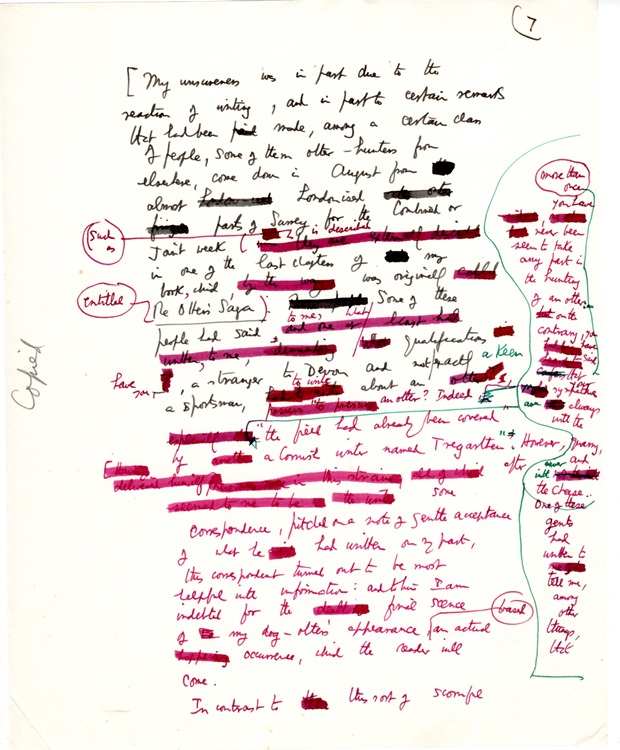

and on the reverse of this headed paper:

*************************
Contents page:
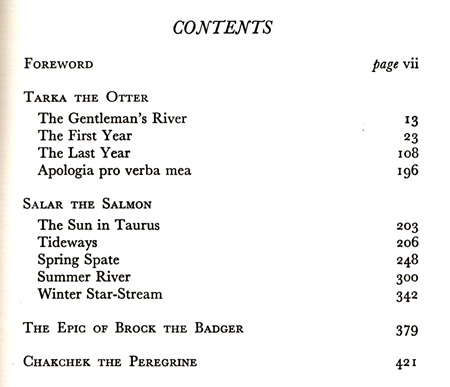
The Foreword:

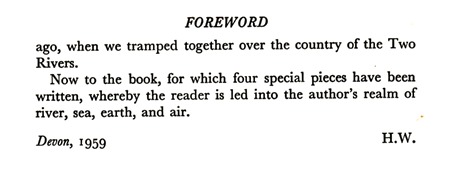
Tarka the Otter (pp. 11‒199) (Matthews calls this 'the Fifth Text', in that there are a few small alterations to the text.)
The dedication has been extended:

There is a new 'Introduction' by HW: 'The Gentleman's River' in which HW gives the background to the original writing; this is a version of an article first printed in Country Life (4 July 1952), where it was accompanied by some very nice photographs of the countryside. This was reprinted in HWSJ 33, September 1997. At the end an 'Apologia pro verba mea' reprints a list of unusual words and their meanings as found in the book, which some critics had complained about (to HW's annoyance) when it was originally published. The ‘Apologia’ was first printed in The London Mercury, whose editor, Jack Squire (later Sir John) was instrumental in putting Tarka the Otter forward for the Hawthornden Prize.
Full details about the story itself can be found within the entry for Tarka the Otter.
***************
Salar the Salmon (pp. 201‒375) (Matthews gives this as the 2nd text with additional material.)
There is a new introduction by HW, 'The Sun in Taurus':
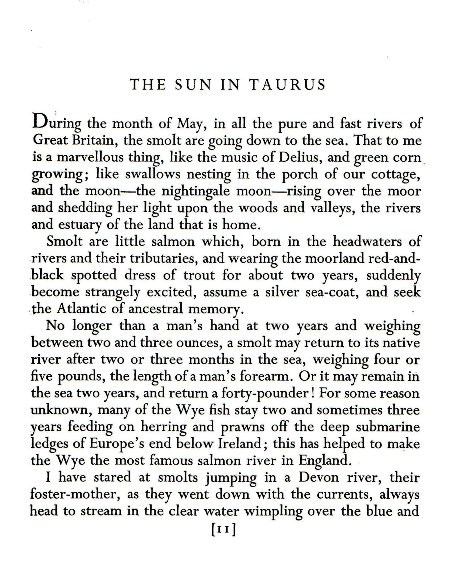

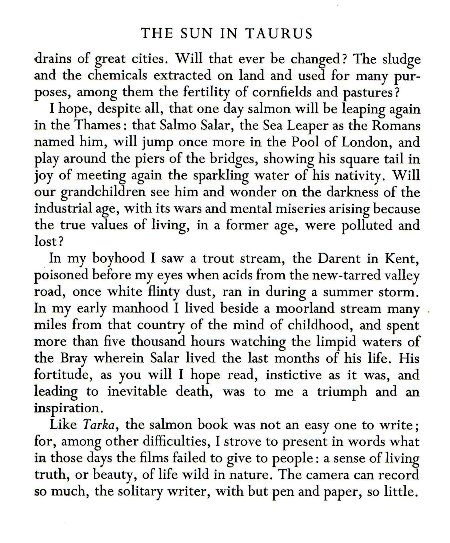
There is also an Epigraph (not noted in the list of Contents): 'A Personal Note', which gives in charming manner the background to the writing of the book:
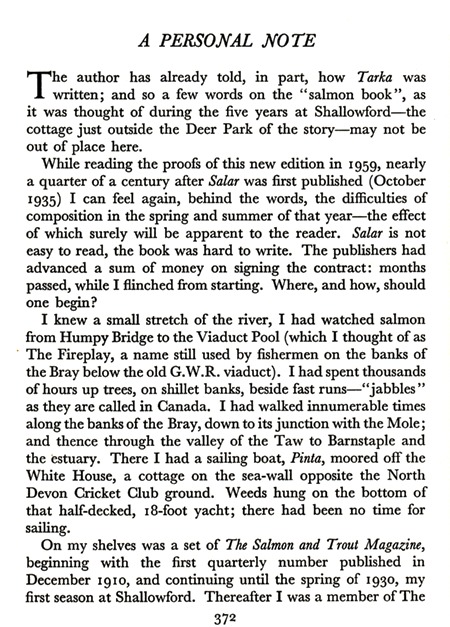



Full details about the background and the actual story can be found in the entry for Salar the Salmon.
***************
The Epic of Brock the Badger (pp. 377‒417), as published in the revised illustrated edition of The Old Stag (Putnam, 1933), where stories originally published in a variety of sources were brought together thus:
'Bill Brock's Farewell' part I – from Outsiders, 1929
'Bloody Bill Brock' – from The Peregrine's Saga, 1923
'Bill Brock's Good Turn' – from The Old Stag, first edition, 1926 and was originally published in Saturday Post and Pearson’s Magazine in 1925.
'Bill Brock's Farewell' part II – from Outsiders, 1929
Here the stories are simplified into three parts:
1) 'Early Days'
2) 'Fang Over-lip'
3) 'The Triumph of Bill Brock'
Again there is a new introduction describing their background, which in 1960 was 'new' information regarding HW's real life, and would have been of great interest to his readers:
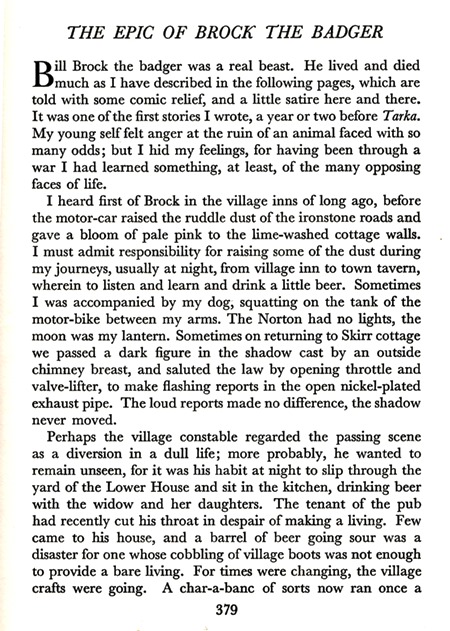
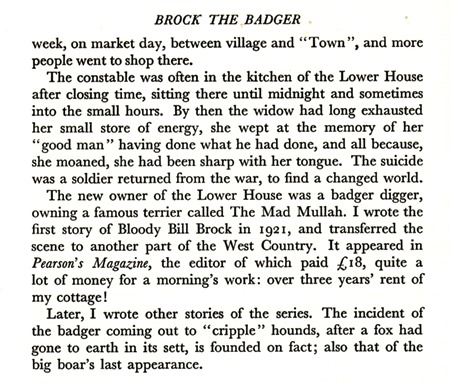
(The Pearson’s Magazine referred to by HW was an American periodical.)
***************
Chakchek the Peregrine (pp 419‒77), as published in revised illustrated edition of The Peregrine's Saga (Putnam 1934):
'The Backbreaker's Bride' (originally in Harper's Magazine, 1932 and Windsor Magazine, 1933)
'No Eel for Nog' (from The Old Stag, 1926)
'The Raid on London' (from The Old Stag, 1926)
'Love and Death of The One-Eyed' (The Peregrine's Saga, 1923; first published in Hutchinson's Magazine, 1923)
'The Vigil of Mousing Keekee' (The Peregrine's Saga, 1923, where its title is 'The Saga of Mousing KeeKee’)
These titles are simplified here as:
1) 'The Backbreaker'
2) 'No Eel for Nog'
3) 'The Raid on London'
4) 'Love and Death'
5) 'Mousing Keekee'
Full details of these stories can be found in the entry for The Peregrine's Saga.
There is a further new introduction by HW:


The last paragraph of this section (and so of the book) is included here, as its theme – that the soul lives on as a star – is one which is found also in The Star-born and The Gold Falcon. HW could not have ended his book on a more uplifting note:

*************************
The book was given a great deal of critical attention, as is shown by the large number of reviews – some shorter items are not included here. They begin with the usual 'alert' in The Bookseller which also includes mention of Malcolm Elwin.

Smith's Trade News, 21 November 1959, reveals a TV programme, as does the monthly British Books, February 1960:

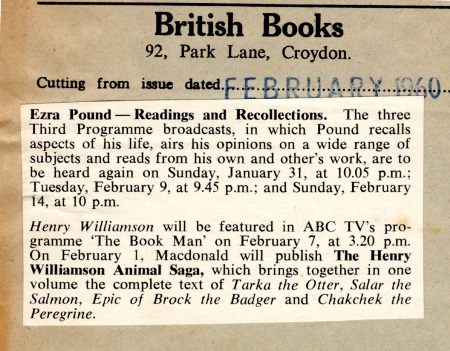
HW noted in his diary on 16 November: 'Bristol – on programme View 10.30 pm. Leave early morning & meet Bob Waller.' And again on 18 November: 'BBC television, Tonight, 6.50 pm.’ Neither entry fits the above – of which he makes no mention.
Smith's Trade News (‘Whitefriar’), 30 January 1960:

Sunday Express (Dee Wells), 31 January 1960. HW must have been considerably annoyed – and upset – that the reviewer repeated Kenneth Allsop's erroneous statement, made when reviewing The Golden Virgin in 1957, that he had been awarded the MC. The 6-column full-page review was accompanied by this magnificent caricature by the Australian cartoonist and illustrator Bill Martin:

For the sake of legibility the columns are presented below in groups of three.
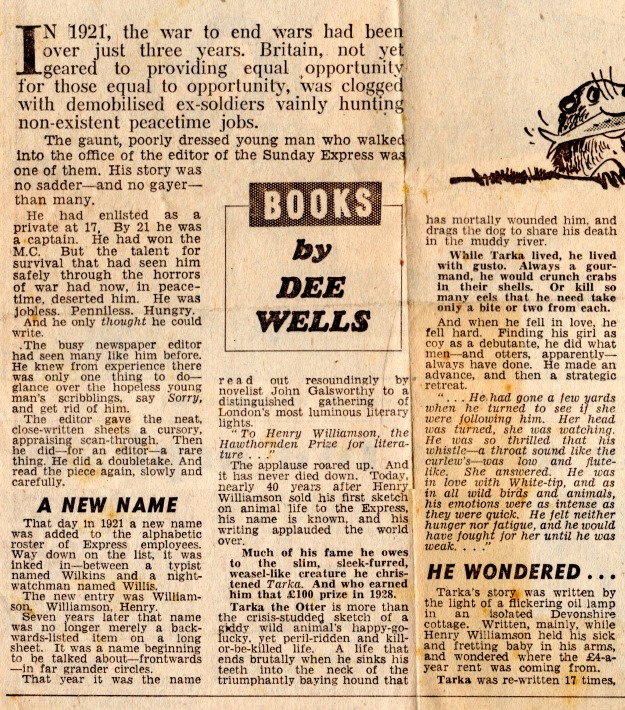

Sunday Graphic (Maurice Wiggin), 31 January 1960:

North Devon Journal, 28 January 1960:

The Irish Press, 30 January 1960:

John O' London's Weekly, 28 January 1960:
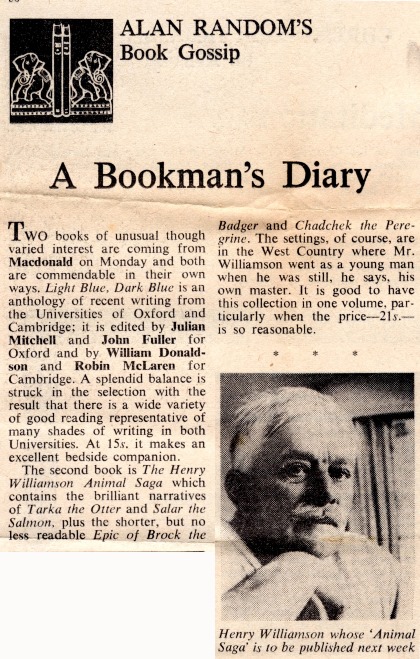
North Devon Journal (Alfred E. Blackwell), 4 February 1960:

Western Morning News, 4 and 5 February 1960:

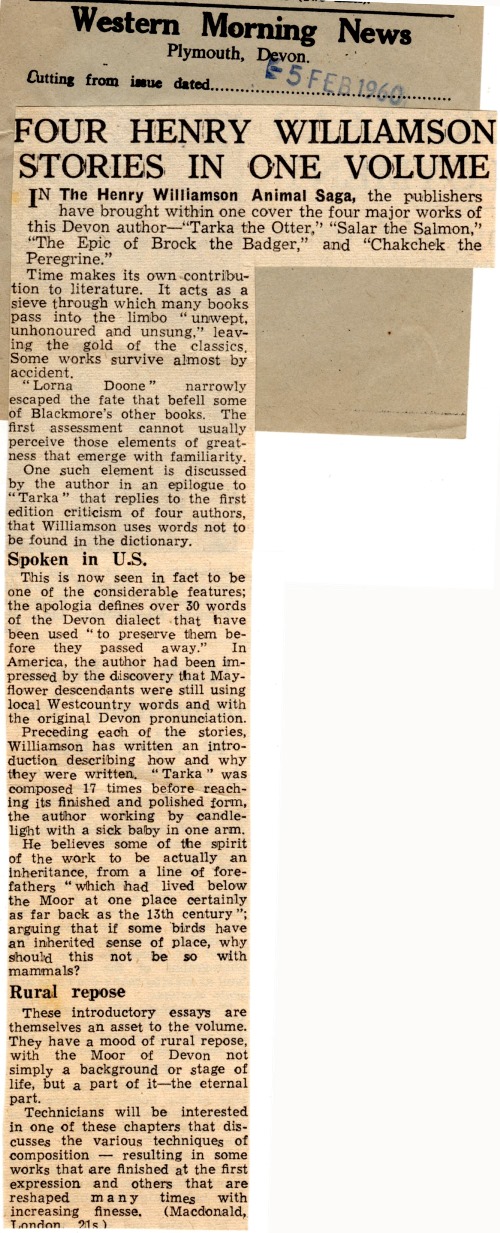
East Anglian Daily Times, 4 February 1960:
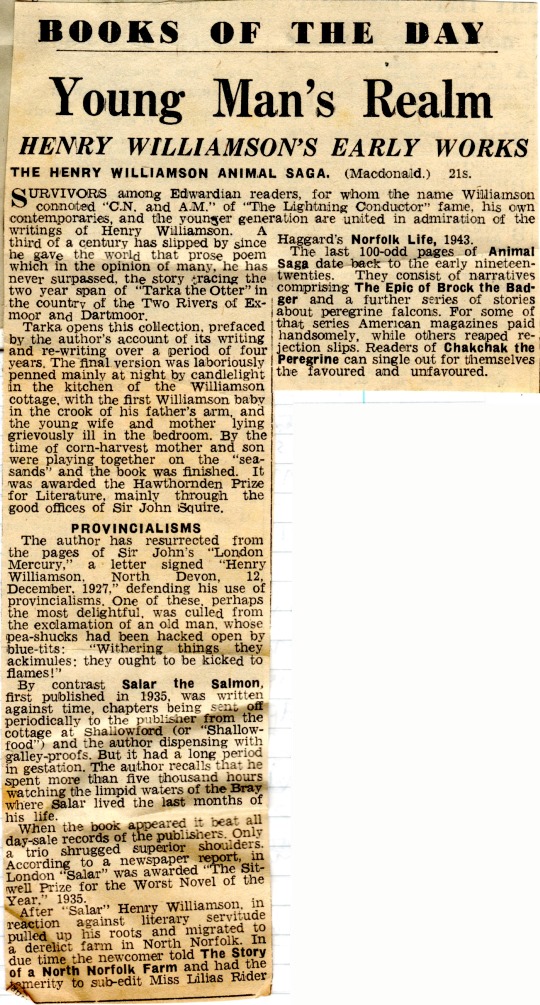
Guardian (Geoffrey Moorhouse), 5 February 1960:

Birmingham Post (L.R.O.S.), 9 February 1960:
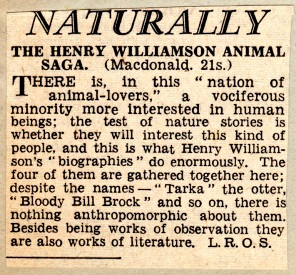
Daily Worker (Wilfred Willett), 11 February 1960:
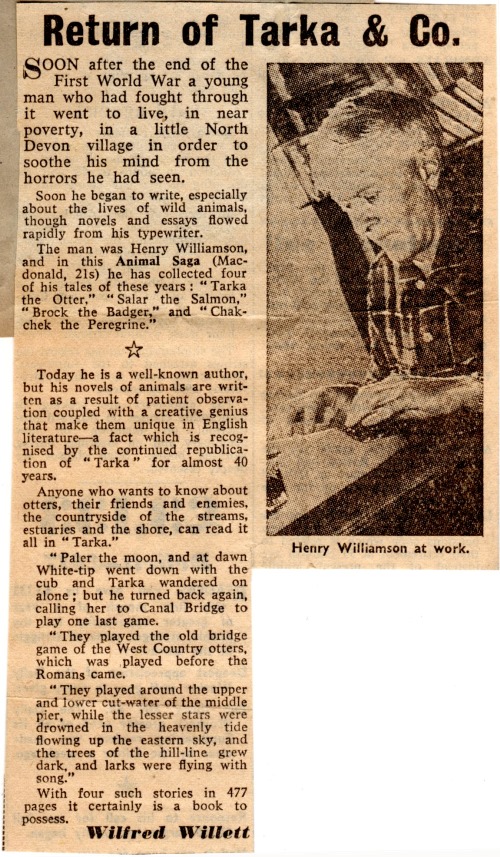
The Times Literary Supplement, 12 February 1960:
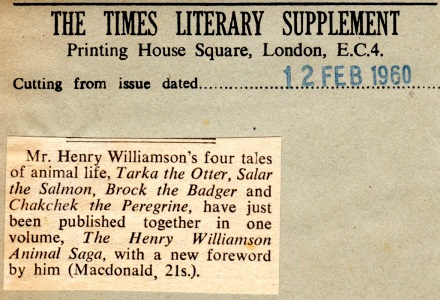
Illustrated London News, 13 February 1960:

The Sunday Times (Maurice Wiggin), 14 February 1960:

Time and Tide, 20 February 1960 (giving current list of best-sellers); and Time and Tide, 31 February 1960 (it’s interesting to note the other books on the lists):
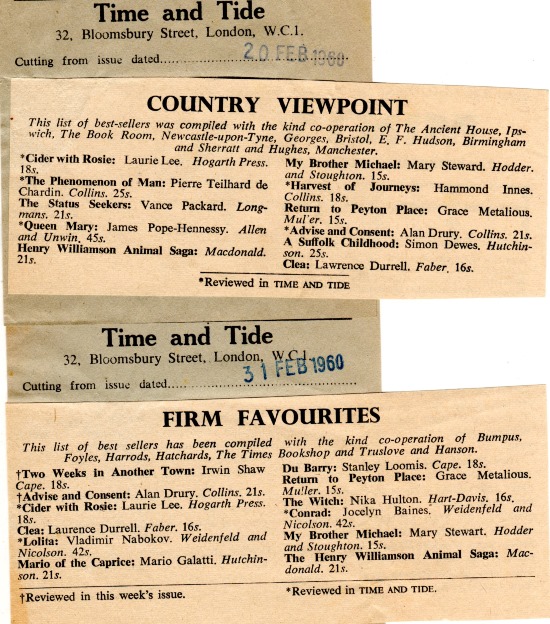
Liverpool Daily Post (E.H.), 24 February 1960:

Express and Echo (Exeter), 26 February 1960:

Eastern Daily Press, 26 February 1960:

Irish Times (J. MacC.), 27 February 1960:

John O' London's Weekly (Anthony Gower), 3 March 1960:
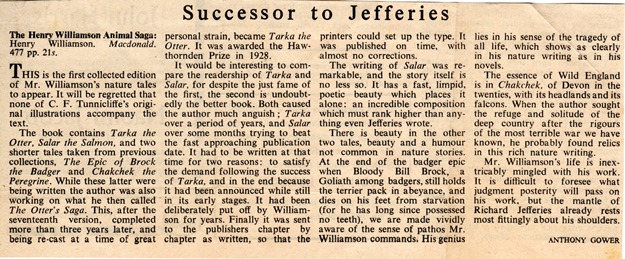
Books and Bookmen, March 1960:

Allan Jackson syndicated his review in several newspapers in early March (all identical) – Doncaster Gazette, Skyrack Express (Tadcaster), North Wales Pioneer, Pontefract Express, and Bridlington Free Press:

Belfast Newsletter (B.), 19 March 1960:
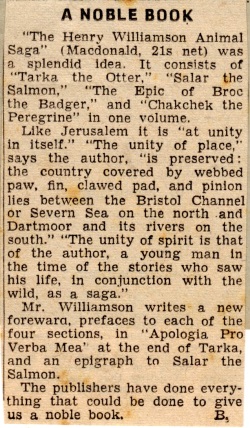
The Bookseller, 26 March 1960 ('Henry Puffmore' was a pseudonym for various Bookseller staff members):

The Time & Tide review mentioned is, sadly, not in the archive file.
Contemporary Review (Grace Banyard), June 1960:
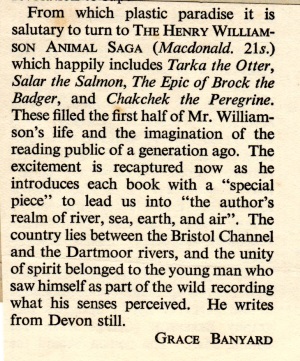
(One wonders what the 'plastic paradise' book was!)
Bolton Evening News (Rachel Singleton), 14 April 1960:
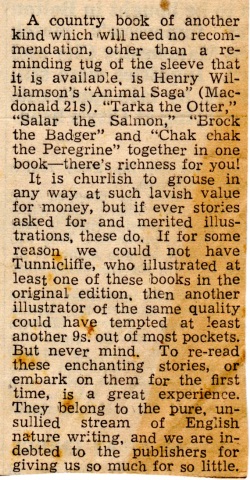
*************************
A small number of reviews of the later reprints are also in the archive, but they do not add anything to the critical overview.
*************************
The first edition, Macdonald, 1960. HW did not like the cover illustration, particularly the image of the otter, as his scathing note note on the galley proof shows (at the top of this page).
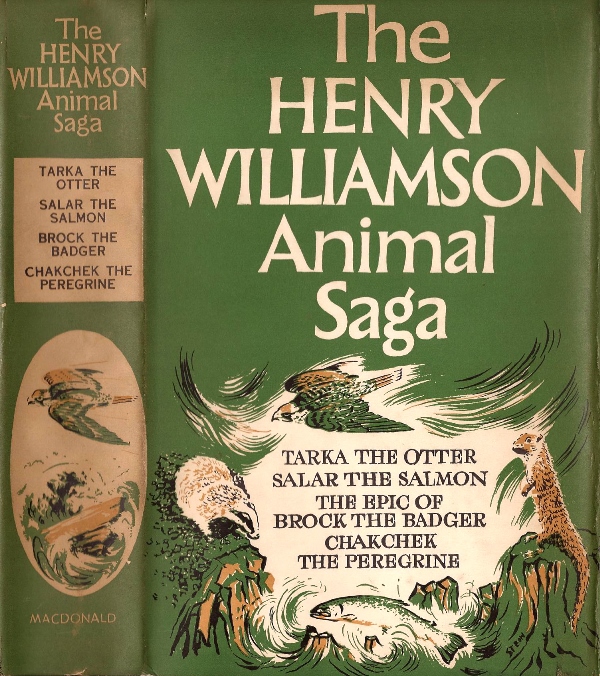
Front and back flaps:
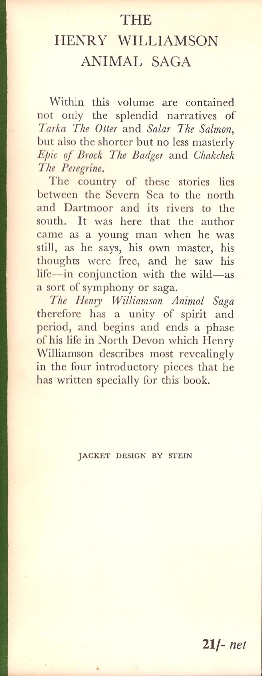 |
 |
Back cover:
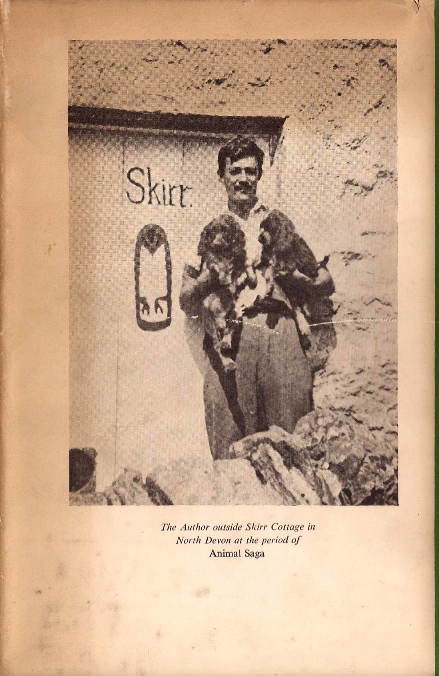
***************
Seventh impression, Macdonald & Jane's, 1978, front cover and flap:
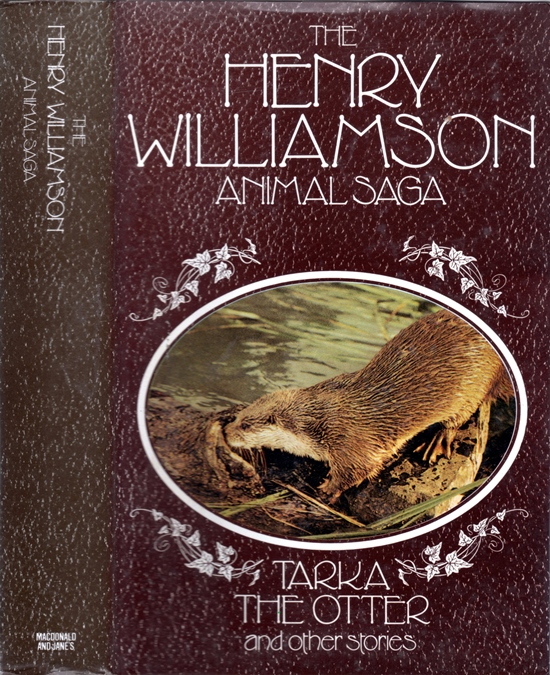

Back cover:
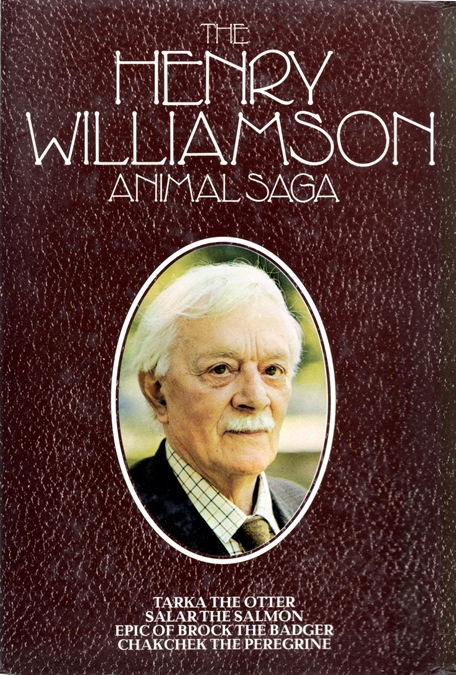
********************
